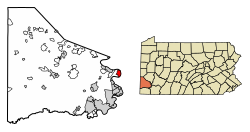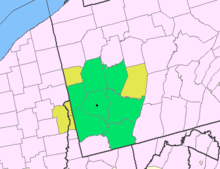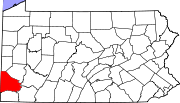Donora, Pennsylvania
Donora, Pennsylvania | |
|---|---|
 Concrete houses in the Cement City neighborhood | |
| Etymology: Portmanteau of "William Donner" and "Nora Mellon" | |
 Location of Donora in Washington County, Pennsylvania. | |
| Coordinates: 40°10′33″N 79°51′41″W / 40.17583°N 79.86139°W | |
| Country | United States |
| State | Pennsylvania |
| County | Washington |
| Established | 1900 |
| Government | |
| • Mayor | Donald Pavelko |
| Area | |
| • Total | 2.05 sq mi (5.30 km2) |
| • Land | 1.90 sq mi (4.92 km2) |
| • Water | 0.15 sq mi (0.38 km2) |
| Population | |
| • Total | 4,569 |
| • Density | 2,406.00/sq mi (928.72/km2) |
| Time zone | UTC−5 (EST) |
| • Summer (DST) | UTC−4 (EDT) |
| ZIP Code | 15033 |
| Area code | 724 |
| Website | www.DonoraBoro.org |
Donora is a borough in Washington County, Pennsylvania, United States, approximately 20 miles (32 km) south of Pittsburgh along the Monongahela River. The population was 4,558 as of the 2020 census.[3]
Donora was incorporated in 1901. It takes its name from a portmanteau of William Donner and Nora Mellon, wife of banker Andrew W. Mellon. The borough's nickname is "The Home of Champions", mainly because of the large number of famous athletes who have called Donora their home, including Baseball Hall of Fame outfielders Stan Musial and Ken Griffey Jr.
During the 1948 Donora smog, air pollution killed 20 people and caused respiratory problems for 6,000 of the 14,000 residents. Agriculture, coal-mining, steel-making, wire-making, and other industries were important to Donora early in its history; its Rust Belt location has lost most of its industrial capacity. It is in the "Mon Valley", 5 miles (8.0 km) downriver from Charleroi and 25 miles (40 km) upstream of Braddock.
History
[edit]
In 1794, the Whiskey Insurrectionists held several meetings at Fells Church, approximately 1 mile (1.6 km) east of Donora.
A trolley line opened in Donora on December 15, 1901, linking First and McKean, and Fifteenth Street and Meldon.[4] It was extended in 1911 to Black Diamond to connect to the Charleroi to Pittsburgh interurban trolley. The line was abandoned on May 5, 1953.
The town was the scene of the infamous Donora Smog of 1948. Between October 26 and October 31, 1948, an air inversion trapped industrial effluent (air pollution) from the American Steel and Wire plant and Donora Zinc Works. During this spike in air pollution, 6,000 people suffered respiratory problems and extreme discomfort.[5] "In three days, 20 people died... After the inversion lifted, another 50 died, including Lukasz Musial, the father of baseball great Stan Musial. Hundreds more finished the rest of their lives with damaged lungs and hearts."[6] The incident made national headlines. Today, the town is home to the Donora Smog Museum which tells the impact of the Donora Smog on the air quality standards enacted by the federal government in subsequent years.[7]
Donora's neighborhood known as "Cement City" is listed on the National Register of Historic Places.[8] The homes built in the neighborhood are completely made out of pre-formed and poured concrete. This structural building technique was championed by Thomas Edison, and was used by neighborhoods throughout the United States. The homes were built as employee housing for the Donora Wire and Steel Mill in the early 1900s.[9]
Donora is home to the world's second largest "Cement City" housing tract, innovated by Thomas Edison. The Cement City Historic District consists of 80 "poured in place" homes.[10] The Cement City Historic District and Webster Donora Bridge are also listed on the National Register of Historic Places.[11]
The Borough of Donora and surrounding areas have also been utilized as the filming location for several films and television shows. Most recently, the American television drama series American Rust starring Jeff Daniels and Maura Tierney used several sites in Donora for filming.[12][13]
Geography
[edit]Donora is located at 40°10′33″N 79°51′41″W / 40.17583°N 79.86139°W (40.175879, −79.861264).[14]
According to the United States Census Bureau, the borough has a total area of 2.0 square miles (5.2 km2), of which 1.9 square miles (4.9 km2) is land and 0.2 square miles (0.5 km2) (7.32%) is water.
Climate
[edit]The climate in this area is characterized by hot, humid summers and generally mild to cool winters. According to the Köppen Climate Classification system, Donora has a humid subtropical climate, abbreviated "Cfa" on climate maps.[15]
| Climate data for Donora, Pennsylvania (1991–2020 normals, extremes 1926–present) | |||||||||||||
|---|---|---|---|---|---|---|---|---|---|---|---|---|---|
| Month | Jan | Feb | Mar | Apr | May | Jun | Jul | Aug | Sep | Oct | Nov | Dec | Year |
| Record high °F (°C) | 78 (26) |
79 (26) |
88 (31) |
92 (33) |
96 (36) |
101 (38) |
105 (41) |
105 (41) |
103 (39) |
95 (35) |
85 (29) |
77 (25) |
105 (41) |
| Mean daily maximum °F (°C) | 38.7 (3.7) |
42.1 (5.6) |
50.9 (10.5) |
64.0 (17.8) |
73.1 (22.8) |
80.7 (27.1) |
84.4 (29.1) |
83.5 (28.6) |
77.5 (25.3) |
66.0 (18.9) |
53.7 (12.1) |
43.2 (6.2) |
63.2 (17.3) |
| Daily mean °F (°C) | 29.6 (−1.3) |
31.9 (−0.1) |
39.7 (4.3) |
51.2 (10.7) |
61.1 (16.2) |
69.4 (20.8) |
73.3 (22.9) |
72.1 (22.3) |
65.7 (18.7) |
54.1 (12.3) |
43.1 (6.2) |
34.4 (1.3) |
52.1 (11.2) |
| Mean daily minimum °F (°C) | 20.5 (−6.4) |
21.8 (−5.7) |
28.6 (−1.9) |
38.4 (3.6) |
49.0 (9.4) |
58.1 (14.5) |
62.2 (16.8) |
60.7 (15.9) |
53.9 (12.2) |
42.2 (5.7) |
32.5 (0.3) |
25.7 (−3.5) |
41.1 (5.1) |
| Record low °F (°C) | −19 (−28) |
−14 (−26) |
−2 (−19) |
11 (−12) |
22 (−6) |
37 (3) |
40 (4) |
38 (3) |
31 (−1) |
17 (−8) |
−1 (−18) |
−11 (−24) |
−19 (−28) |
| Average precipitation inches (mm) | 2.90 (74) |
2.43 (62) |
3.14 (80) |
3.40 (86) |
4.30 (109) |
4.39 (112) |
4.31 (109) |
3.64 (92) |
3.55 (90) |
3.05 (77) |
2.84 (72) |
2.90 (74) |
40.85 (1,038) |
| Average snowfall inches (cm) | 5.7 (14) |
7.2 (18) |
4.6 (12) |
0.1 (0.25) |
0.0 (0.0) |
0.0 (0.0) |
0.0 (0.0) |
0.0 (0.0) |
0.0 (0.0) |
0.0 (0.0) |
0.5 (1.3) |
3.3 (8.4) |
21.4 (54) |
| Average precipitation days (≥ 0.01 in) | 15.4 | 11.9 | 12.8 | 13.7 | 13.7 | 12.5 | 11.3 | 10.2 | 9.7 | 11.5 | 11.6 | 13.1 | 147.4 |
| Average snowy days (≥ 0.1 in) | 5.3 | 3.7 | 1.9 | 0.2 | 0.0 | 0.0 | 0.0 | 0.0 | 0.0 | 0.0 | 0.4 | 2.9 | 14.4 |
| Source: NOAA[16][17] | |||||||||||||
Surrounding and adjacent neighborhoods
[edit]Donora is only bordered by land with Carroll Township to the north, south and west. Across the Monongahela River to the east, Donora runs adjacent with Rostraver Township in Westmoreland County.
Demographics
[edit]| Census | Pop. | Note | %± |
|---|---|---|---|
| 1910 | 8,174 | — | |
| 1920 | 14,131 | 72.9% | |
| 1930 | 13,905 | −1.6% | |
| 1940 | 13,180 | −5.2% | |
| 1950 | 12,186 | −7.5% | |
| 1960 | 11,131 | −8.7% | |
| 1970 | 8,825 | −20.7% | |
| 1980 | 7,524 | −14.7% | |
| 1990 | 5,928 | −21.2% | |
| 2000 | 5,653 | −4.6% | |
| 2010 | 4,781 | −15.4% | |
| 2020 | 4,558 | −4.7% | |
| 2021 (est.) | 4,526 | [3] | −0.7% |
| Sources:[18][19][20][21][2] | |||
As of the census[20] of 2000, there were 5,653 people, 2,469 households, and 1,434 families residing in the borough. The population density was 2,973.8 people per square mile (1,148.2 people/km2). There were 2,958 housing units at an average density of 1,556.1 per square mile (600.8/km2). The racial makeup of the borough was 82.10% White, 14.84% African American, 0.14% Native American, 0.27% Asian, 0.02% Pacific Islander, 0.32% from other races, and 2.32% from two or more races. Hispanic or Latino people of any race were 2.02% of the population.
There were 2,469 households, out of which 23.4% had children under the age of 18 living with them, 36.9% were married couples living together, 16.5% had a female householder with no husband present, and 41.9% were non-families. 37.4% of all households were made up of individuals, and 21.3% had someone living alone who was 65 years of age or older. The average household size was 2.23 and the average family size was 2.95.
In the borough the population was spread out, with 21.7% under the age of 18, 6.4% from 18 to 24, 25.5% from 25 to 44, 21.4% from 45 to 64, and 25.0% who were 65 years of age or older. The median age was 42 years. For every 100 females, there were 82.7 males. For every 100 females age 18 and over, there were 78.4 males.
The median income for a household in the borough was $27,939, and the median income for a family was $37,176. Males had a median income of $33,725 versus $22,346 for females. The per capita income for the borough was $17,893. About 12.4% of families and 16.8% of the population were below the poverty line, including 28.2% of those under age 18 and 14.0% of those age 65 or over.
Industry
[edit]Though many group Donora in a class of Western Pennsylvania towns and cities known collectively as the "rust belt" because of the demise of the once prolific steel industry, the town continues to be a center for industry and manufacturing. On the site of the former steel mills now stands a large industrial park that is managed by MMIDA (Mid Mon Valley Industrial Development Authority).
Major companies that have facilities in the Donora Industrial Park include A-1 Babbit company, Apex N.A., Area Agency on Aging, Bergen Power Pipe Supports, BMA of Donora, HYTEC Inc., Dyno-Nobel Inc, Eastern Alloy, Eastern Hydraulic & Machine, Elizabeth Milling Corporation, Elliott Support Services, Glosser MFG, Industrial Nonferrous Casting Company, K-Z Tool Company, Airgas Specialty Products, Inc. (formerly LaRoche Industries), McGrew Welding Fabrication, Metalife Resources, MIDA Inc., Mon Valley Child Care, Mon Valley Sewage Authority, Monessen Ambulance Service, Nitrous Oxide Corporation, Power & Industrial Services Corporation, Nichols Miniatures, Pittsburgh Post Gazette Distribution Center, RAS Industries Inc., Regal Industries Inc.and Spartech Polycom.[22]
Government
[edit]Donora is a borough and consists of an elected mayor and an elected borough council. For nearly three decades, John "Chummy" Lignelli was the mayor of the Borough of Donora, until he retired at age 93.[23] The current mayor is Donald Pavelko.[24]
Schools
[edit]Donora is part of Ringgold School District, which includes the municipalities of Donora, Monongahela, Carroll Township, Nottingham Township, New Eagle, Finleyville, and Union Township.
Notable people
[edit]- Frances Dorothy Acomb, historian and academic
- Mary Amdur, scientist, investigated the 1948 Donora smog[25]
- Robert Costanza, ecological economist
- Devra Davis, scientist, investigated the 1948 Donora smog[25]
- Arnold Galiffa, All-American and professional football player player; inductee to the College Football Hall of Fame[26]
- Ken Griffey Jr., Baseball Hall of Fame Centerfielder[27]
- Ken Griffey Sr., baseball player; his father was Joseph "Buddy" Griffey, a local athlete who was a teammate of Stan Musial on the Donora High School baseball team[27]
- Stan Musial, baseball player with the St. Louis Cardinals and an inductee to the Baseball Hall of Fame
- Reggie Walton, United States District Judge for the District of Columbia, appointed in 2001 by President George W. Bush
References
[edit]- ^ "ArcGIS REST Services Directory". United States Census Bureau. Retrieved October 12, 2022.
- ^ a b "Census Population API". United States Census Bureau. Retrieved October 12, 2022.
- ^ a b Bureau, US Census. "City and Town Population Totals: 2020-2021". Census.gov. US Census Bureau. Retrieved July 22, 2022.
{{cite web}}:|last1=has generic name (help) - ^ Paglia, Ron (June 25, 2006). "Riding down memory lane". Pittsburgh Tribune-Review. Retrieved October 15, 2009.[permanent dead link]
- ^ John Bachmann, David Calkins, Margo Oge. “Cleaning the Air We Breathe: A Half Century of Progress.” EPA Alumni Association. September 2017. Page 9.
- ^ The Globe and Mail, December 7, 2002, book review by Andrew Nciforuk When Smoke Ran Like Water by Devra Davis
- ^ "Smog Deaths In 1948 Led To Clean Air Laws". NPR.org. Retrieved August 17, 2011.
- ^ "Cement City Historic District". NPGallery Search. February 16, 1996. Archived from the original on February 26, 2024.
- ^ "Cement City Historic District, Donora Borough, Washington County, Donora PA 15033". tonyrosica.livingplaces.com. Archived from the original on August 30, 2019. Retrieved April 2, 2018.
- ^ Zuchowski, Dave (October 8, 2014). "Cement City in Donora open for tour". Pittsburgh Post-Gazette. Retrieved April 2, 2018.
- ^ "National Register Information System". National Register of Historic Places. National Park Service. July 9, 2010.
- ^ "Filming in the Laurel Highlands | Locations & Permits". www.golaurelhighlands.com.
- ^ "Showtime mini-series "Rust" to film scenes in Donora".
- ^ "US Gazetteer files: 2010, 2000, and 1990". United States Census Bureau. February 12, 2011. Retrieved April 23, 2011.
- ^ "Climate Summary for Donora, Pennsylvania". Weatherbase.com. Retrieved April 2, 2018.
- ^ "NowData – NOAA Online Weather Data". National Oceanic and Atmospheric Administration. Retrieved August 8, 2021.
- ^ "Station: Donora 1 SW, PA". U.S. Climate Normals 2020: U.S. Monthly Climate Normals (1991-2020). National Oceanic and Atmospheric Administration. Retrieved August 8, 2021.
- ^ "Number of Inhabitants: Pennsylvania" (PDF). 18th Census of the United States. U.S. Census Bureau. Retrieved November 22, 2013.
- ^ "Pennsylvania: Population and Housing Unit Counts" (PDF). U.S. Census Bureau. Retrieved November 22, 2013.
- ^ a b "U.S. Census website". United States Census Bureau. Retrieved 2008-01-31.
- ^ "Annual Estimates of the Resident Population". U.S. Census Bureau. Archived from the original on October 19, 2013. Retrieved November 22, 2013.
- ^ "Mmida.com is for sale | HugeDomains". Archived from the original on June 16, 2013.
- ^ Sellew, Jeremy (September 12, 2014). "Donora mayor, 93, decides to retire". TribLive. Retrieved April 30, 2024.
{{cite news}}: CS1 maint: url-status (link) - ^ "Elected Officials | BOROUGH OF DONORA, Pennsylvania, Incorporated February 11, 1901". Retrieved May 2, 2024.
- ^ a b Musil, Robert, K. (2014). "2. Don't Harm the People: Ellen Swallow Richards, Dr. Alice Hamilton, and their heirs take on polluting industries". Rachel Carson and Her Sisters: Extraordinary Women Who Have Shaped America's Environment. Rutgers University Press. ISBN 9780813571768. Retrieved January 4, 2016.
{{cite book}}: CS1 maint: multiple names: authors list (link) - ^ "Arnold Galiffa (1983)". footballfoundation.org. Retrieved July 29, 2023.
- ^ a b "Stan Musial and the Donora High School baseball team | Multimedia". stltoday.com. January 24, 2013. Retrieved April 2, 2018.
Further reading
[edit]- Bryson, Chris (Fall 1998). "A Secret History of America's Worst Air Pollution Disaster". Earth Island Journal. 13.
- Davis, Devra (2002). When Smoke Ran Like Water: Tales of Environmental Deception and the Battle Against Pollution. Basic Books. ISBN 978-0-465-01521-4.
- Jacobs, Elizabeth T., Jefferey L. Burgess, and Mark B. Abbott. "The Donora smog revisited: 70 years after the event that inspired the clean air act." American journal of public health 108.S2 (2018): S85-S88.
- McPhee, Andy. Donora Death Fog: Clean Air and the Tragedy of a Pennsylvania Mill Town (University of Pittsburgh Press, 2023)
- Snyder, Lynn Page (1994). The Death-Dealing Smog over Donora, Pennsylvania: Industrial Air Pollution, Public Health, and Federal Policy, 1915–1963. University of Pennsylvania.
- Stacey, Charles (2010). Donora. Arcadia Publishing. ISBN 978-0-7385-7206-2.
- University of Pittsburgh Archives Service Center, Bruce Drisbach-American Steel & Wire Company Photograph Collection (Donora, Pennsylvania, 1915–1917)



